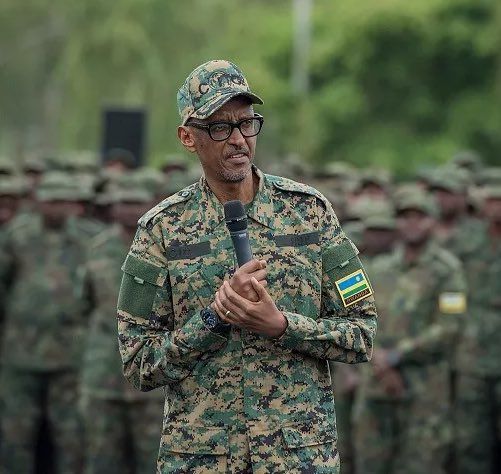PAUL KAGAME
- Get link
- X
- Other Apps
PAUL KAGAME
Paul Kagame, born on October 23, 1957, is the current President of Rwanda and one of Africa’s most influential political figures. Known for his strong leadership and vision, Kagame has played a central role in transforming Rwanda from a country devastated by genocide into a rapidly developing nation with a growing economy and international presence.
Kagame was born in Tambwe, Rwanda, but his family fled to Uganda in the early 1960s following ethnic tensions and violence. He grew up as a refugee and later joined the National Resistance Army (NRA) in Uganda, led by Yoweri Museveni. After helping Museveni rise to power in 1986, Kagame co-founded the Rwandan Patriotic Front (RPF), a rebel group made up mainly of Tutsi refugees. The RPF's mission was to return refugees to Rwanda and end decades of discrimination and exclusion.
Kagame became the head of the RPF in 1990. Under his command, the RPF launched a military campaign that eventually brought an end to the 1994 Genocide against the Tutsi, in which an estimated 800,000 people were killed in just 100 days. After the genocide, the RPF formed a new government, and Kagame served as vice president and minister of defense. In 2000, following the resignation of President Pasteur Bizimungu, Kagame was appointed president by the transitional government. He was later elected in 2003, 2010, and 2017 with overwhelming majorities.
Under Kagame's leadership, Rwanda has seen significant political and economic transformation. He introduced policies focused on national unity, reconciliation, and development. His government banned ethnic labels and promoted the idea of a unified Rwandan identity. Institutions such as the National Unity and Reconciliation Commission (NURC) were established to rebuild trust and heal the wounds of the genocide.
Economically, Rwanda has become one of the fastest-growing countries in Africa. Kagame’s government emphasized good governance, anti-corruption, and efficient public services. Investments in infrastructure, education, and technology—especially the promotion of ICT—have played a key role in Rwanda’s development. The capital city, Kigali, is now recognized as one of the cleanest and most organized cities in Africa.
Another remarkable aspect of Kagame’s leadership is his commitment to gender equality. Rwanda has the highest percentage of women in parliament in the world, a result of deliberate policies that empower women in leadership and decision-making. Kagame has also promoted environmental sustainability, initiating policies such as monthly community service (Umuganda), plastic bag bans, and conservation of national parks.
Despite these achievements, Kagame’s presidency has been criticized by some international human rights organizations. Critics argue that Rwanda under Kagame has limited political freedoms, suppressed opposition voices, and restricted press freedom. Several opposition leaders have faced imprisonment or exile. Kagame, however, defends his government by emphasizing stability, national unity, and security, arguing that Rwanda's history demands strong leadership to prevent division and violence.
In 2015, a referendum approved changes to the constitution, allowing Kagame to potentially remain in office until 2034. While this move was supported by many Rwandans, it also raised concerns about democratic principles and term limits.
President Paul Kagame is widely respected in Africa and around the world. He has served as Chairperson of the African Union (AU) and is an advocate for reforming international organizations, including the AU and the United Nations. His leadership model—focused on accountability, self-reliance, and strategic planning—has made Rwanda a case study in post-conflict recovery and development.
President Paul Kagame has played a pivotal role in the development and transformation of the Rwanda Defence Force (RDF). As one of the key commanders of the Rwandan Patriotic Army (RPA), which later became the RDF, Kagame led a disciplined liberation struggle that ended the 1994 Genocide against the Tutsi and restored stability to the country. His leadership style emphasized professionalism, unity, and national service, helping transform the RDF into one of the most respected and capable military institutions in Africa.
Under Kagame’s leadership, the RDF has evolved from a guerrilla force into a modern, well-trained, and well-equipped army focused on national security, peacekeeping, and humanitarian missions. The RDF has participated in several international peacekeeping operations under the United Nations and the African Union, showcasing Rwanda’s commitment to regional and global peace.
Kagame has consistently promoted values of patriotism, discipline, and accountability within the RDF. His vision of a people-centered army has led to the RDF being actively involved in development initiatives such as infrastructure projects, health campaigns, and disaster response within Rwanda. Overall, Kagame's role in building the RDF is seen as a key part of his broader vision for a strong, secure, and self-reliant Rwanda.
Paul Kagame is a complex and influential leader. While admired for rebuilding Rwanda and promoting development, he remains a controversial figure regarding governance and political freedom. Nonetheless, his impact on Rwanda and Africa is undeniable, and his legacy will continue to shape the future of the region.
- Get link
- X
- Other Apps
.jpeg)


%20Free%20Download.jpeg)


Comments
Post a Comment